The Spa Village of Lanjarón
Lanjarón and its Fountain of Youth...
With clean air, stunning mountain views, and authentic Alpujarra culture Lanjarón is a thriving spa town that is especially known for the purity and healing qualities of its water...Not only does the famous Lanjarón-brand bottled water originate in this tiny village but people come from all over the world to indulge in a whole range of healthful treatments stemming from its hot mineral springs... which are described as "health-restoring".
What an admirable place. You should come to visit this paradise. I have found curious romances and tales! -- Lanjarón
Check out the other Alpujarra villages: Órgiva - Pampaneira - Bubión - Capileira - Pitres - Trevélez

** The pretty village of Lanjarón
The main streets of Lanjarón are very pretty and lined with towering Sycamore trees. Off the main road, you will find the ancient Moorish quarter, el Barrio Hondillo, with its tunneled walkways and overhead wooden beams (tinaos), flower-filled alleys, and overflowing fountains. There is also a nice park on the edge of town with many hiking trails, called Parque el Salado.
An old Moorish castle can be found on the outskirts of Lanjarón, which is set upon a dramatic pinnacle of rock with inspiring views of the surrounding mountains. Legend has it that the Moorish ruler of Lanjarón threw himself from the tower of this castle, rather than surrendering to the Catholic King during an epic battle between the Christians and the Moors.
Lanjarón also has four Ermitas (interesting small rural churches) you can visit; Ermita de San Isidro, Ermita de San Roque, Ermita de San Sebastián, and Ermita del Tajo de la Cruz.
Contents on This Page
- Where is Lanjarón?
- Lanjarón - The Water
- Lanjarón - The Fountain of Youth
- Lanjarón - The Spa
- Where to Stay in Lanjarón?
- The Best Places to Eat!
- What to Do in Lanjarón?
- Lanjarón's Hondillo Neighborhood
- Visit the Top Sites
- The Salado Park & Castle of Lanjarón
- Hiking In and Around Lanjarón
- Cycling Routes Near Lanjarón
- Join a Tour to Lanjarón
- The Tourist Office
- When to Visit Lanjarón
- How to Arrive
- Lanjarón - The History
Where is Lanjarón?
For those wanting a quick rural getaway and a desire to experience the abundant natural beauty of the Alpujarras, Lanjarón is the perfect place to start.Just 45 km from the capital city of Granada and resting at the edge of the Lecrin Valley... at the foothills of the Sierra Nevada... Lanjarón is considered to be the "Gateway Village" or "Starting-off Point" for an incredible adventure to these ancient Moorish villages.
The town is easily accessible by major roads and sits about midway between Granada and the Mediterranean coast (Costa Tropical). The drive will take you about 40-minutes from either direction.
A visit to the town of Lanjarón can be done in just a few hours.

** The blue doors of Lanjarón
Lanjarón - The Water
In Lanjarón, the water springs eternal...Being at the lowest point of the Sierra Nevada mountains has blessed this little village with the purest and most mineral-rich water in Spain. The fresh melting snow from the Sierra's highest peaks pours down over the mountainsides, through the cracks and crevices, and into the rivers and streams that converge in Lanjarón.
The water bubbles up in the town's hot springs and overflows from the fountains sprinkled along its streets and alleyways. The melody of the water all around you is not just refreshing but invigorating.
Note: Lanjarón took advantage of the purity of its water and opened the first bottled water company in Spain... it is sold throughout the country today.


** (1) Pretty Bridge & Stream in Salado Park, Lanjarón. (2) One of the many fountains in town.
Lanjarón - The Fountain of Youth
Some say Lanjarón is home to the long sought-after "Fountain of Youth".No one knows exactly what makes the people of Lanjarón endure for so long, or to be as physically fit as they are... but some say it's the perfect combination of a few crucial elements...
- Its wonderful micro-climate: Lanjarón is situated on the edge of a valley and surrounded by large mountains, protecting it from harsh winters and cooled by mountain breezes during hot summers
- The freshness and purity of its mountain air
- The Mediterranean diet the locals so enjoy
- The abundant mineral-rich quality of its water
Lanjarón - The Spa
One of Lanjarón's main attractions is its spa. The Balneario is the most well-known healing spa in Andalucia and its hot springs are considered to be the best in Spain.The story goes that a very sick man visited Lanjarón over 300 years ago. He drank from the town's hot springs and was quickly healed of all his infirmities.


** The famous Balneario Spa with its magical waters in Lanjarón, Spain
Since that time, the spa has been exceedingly popular, especially with the nobility and elites. The Balneario de Lanjarón has welcomed such visitors as Federico García Lorca (famed Spanish poet), Manuel de Falla (Spanish composer and pianist), Virginia Wolf (British modernist author), and Beltrán Rusell (Earl Russell).
In 1928, the Balneario's neo-Mudéjar style building and tower were built. Today it offers a large selection of therapeutic services with a focus on purification, relaxation and stress relief, muscle health, beauty and wellness, and back pain.
Contact Information:
Address: Avda.de Madrid 2, 18420 Lanjarón (Granada)
Telephone: (+34) 902 104 841
E-mail: reservas@relaistermal.com
Website: www.balneariodelanjaron.es
MAKE YOUR RESERVATION: +34 958 770 454
** The Balneario de Lanjarón is open from March to December.

| Thermal Programs: Each program contains a combination of treatments | |
| Healthy Waters: | 32€ |
| Health & Relaxation: | 54€ |
| Stress Out: | 64€ |
| Take Care of Your Back: | 66€ |
| Health & Beauty: | 89€ |
For more information on these packages visit the Balneario de Lanjarón website.
Where to Stay in Lanjarón
Because of the popularity of the Lanjarón Spa, this bustling village has quite a few options for hotels or hostels, most of which are right in the middle of town and a short walk to everything.If you are touring the Alpujarras and visiting the towns of Lanjarón and Órgiva, or planning on doing one of the local hikes... we would suggest staying locally for a night or two... There is a lot to see and do in this area.
For hotels in this area, check both Lanjarón and Órgiva as they are just a few kilometers apart.
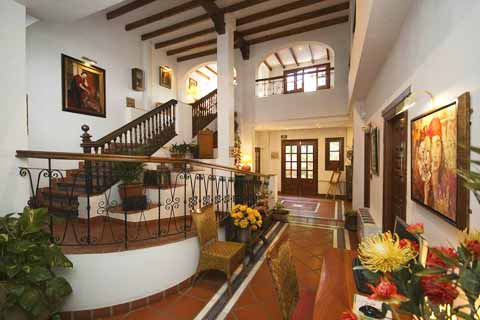

Rent a Pretty Cottage or Traditional Berber-Style Home
Another option, if you are looking for a little more space and privacy, is to rent an original Berber-style cottage. There are several choices just on the outskirts of town that are lovely.

The Best Places to Eat in Lanjarón!
Lanjarón's cuisine consists of typical Alpujarra dishes, which are hearty yet delicious. They are especially known for their locally cured ham, cheeses, and fortified wines. Lanjarón has a nice selection of bars and restaurants and is usually quite festive throughout the year.Two of the restaurants we enjoy the most while in town are...
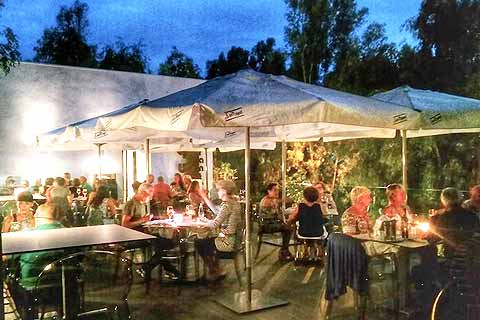

What to Do in Lanjarón?
A walk through beautiful Lanjarón will take 1-2 hours, including a nice lunch. But if you plan to do some hiking or visit the castle and museums, set aside at least half a day.Start with a walk through the old town, then make your way along the main road where you will find Salado Park and the castle walk, then visit some of the sites below...
1. Wander Through Lanjarón's Historic Hondillo Neighborhood
If Lanjarón is the first Alpujarra village on your adventure, take notice of its special Berber architecture. As you go further up into the mountains these characteristics will become more pronounced but you will first start to see them here.The town is a typical Spanish, white-washed village with winding streets and alleys adorned with abundant and overflowing flowers and vines. You will see that the roofs are becoming flatter to make use of a typical Alpujarran addition, the "Chimney Pots". You may also notice that many of the alleyways are covered and held up with wooden beams to protect the locals during harsh winters, these are called "Tinaos".


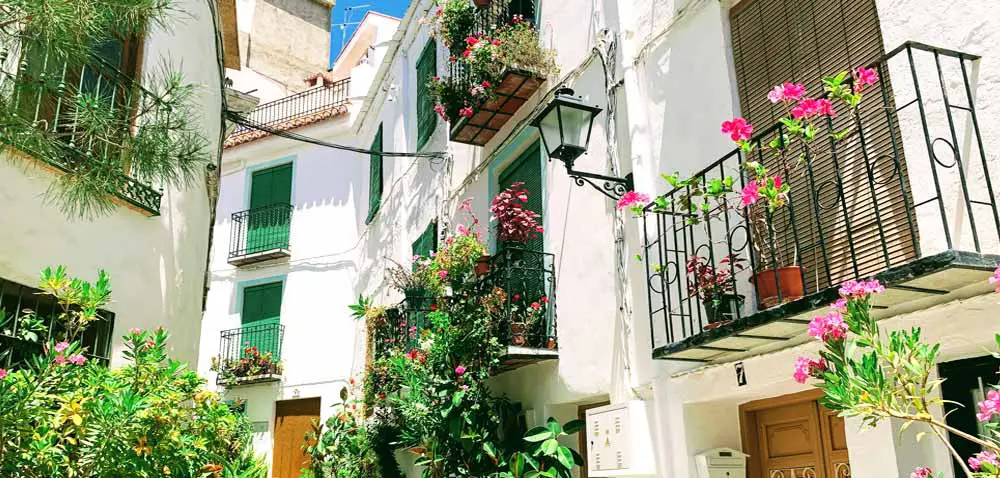
** (1) Traditional 'tinao' and tunnel. (2-3) Pretty flower-filled corners in Lanjarón.
This stunning architecture comes from the Moors that lived in the area hundreds of years ago and can still be seen today in the Atlas Mountains of Morocco.
Another thing to look out for in Lanjarón is the vast number of fountains. The town's water supply comes from the high peaks of the Sierra Nevada and can be felt and heard everywhere! Have a taste, it's so refreshing on a hot day!
2. Visit Lanjarón's Other Top Sites - What not to Miss...
The top places to see while you're in the village of Lanjarón are:
- The Honey Museum - On the western end of town and hidden within a lush forest you will find this wonderful little museum that the kids will love. It houses a series of dynamic and interactive exhibits through which you will learn all about the life of a bee and the sweet world of honey.
Address: Camino Barrancos s/n, Lanjarón 18420 Granada
Telephone: (+34) 958 771 196
E-mail: mieldegranada@mieldegranada.com
Website: www.mieldegranada.com
Schedule:
Fall / Winter:
Tuesday - Sunday: (Mornings Only) 10:00 - 14:00
Saturday & Sunday: 16:00 - 18:00
Spring & Summer:
Tuesday - Sunday: (Mornings) 10:00 - 14:00
Tuesday - Friday: (Afternoon) 16:00 - 18:00
Saturday & Sunday: 16:00 - 20:00
PRICE: 3:00 €
- Church of the Incarnation - Built on the site of an old mosque and destroyed by fire during the Moorish revolts, this Mudejar style church sits just at the center of town. Its tower and beautiful facade were added in the 19th century.
Also, of interest are the Ermita San Roque & Ermita de San Isidro which you will also find along the main road.


** The Museum of Honey in Lanjarón, and the Ermita de San Roque.
- The Poet Lorca & The Fountains -
Spilling from fountains sprinkled throughout town are the pure, therapeutic waters that flow from Lanjarón's hot springs and which are accompanied by the eloquent words of famed Spanish poet Federico García Lorca.
Lanjarón was a base for Lorca for over 15 years while he explored life in la Alpujarra until his murder in 1936 during the Spanish Civil War. His words, like his memory, remain forever ingrained in this beautiful place...
...and I felt the springs gush forth as a child... I heard them. It was the same flowing full of music and ignored science.
- The Water Museum - An interesting museum that allows the visitor to enjoy a unique journey through the history of the water in Lanjarón.
- The Nasrid Bridge / Tablate - A site of great historical importance. Just 7 km to the west of Lanjarón, you will find this ancient Nasrid bridge where in 1569 a battle took place between the Christians and the Moors.
At that time the Tablate bridge was the only access point to the upper Alpujarra regions. Whoever controlled this bridge not only controlled passage into the Alpujarras but much of the Lecrin Valley as well.
- The Hermitage of Our Lady of the Sorrows - A small place of worship just across the road from the Tablate bridge.
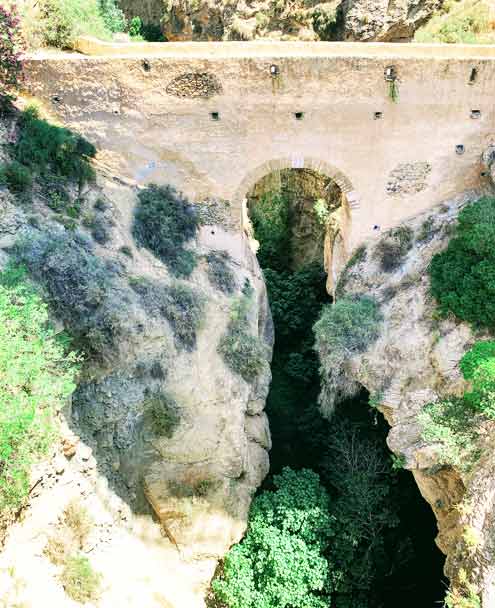

** The Nasrid Bridge and Hermitage of Our Lady of Sorrows just outside of Lanjarón.
- Mirador de la Cañona - Lanjarón has several miradors with spectacular views. The Mirador de la Cañona, named for the cannon sitting at its center, is located just along the main road with stunning views of the valley below and Lanjarón's medieval castle. The old cannon was used during the War of Independence to defend the town against Napoleon’s troops.
- Statue of Two Old Men - A bronze statue in the center of town with the name "Two Old Men", which we agree looks more like an elderly couple... a man and a woman.
- Public Pool & Gardens - Here is another spot in town the kids will like... the public pool and gardens. For a small price, you can swim and spend the day here...


** Statue of "Two Men" and the beautiful public pool and gardens in Lanjarón.
3. Salado Park and the Lanjarón Castle Walk
Towards the western end of town and just across the street from the Balneario de Lanjarón you will find this gorgeous and fun park. Settled deep within a leafy green forest full of towering pines and babbling brooks, Salado Park is the perfect spot to take a break and enjoy nature.There are hiking trails, play areas for kids, an outdoor cafe for a quick snack, and a large pavilion where live music can often be heard floating through the crisp mountain air.

** Trail through Salado Park to the Lanjarón Castle, about 20 min.
If you dive deeper into the park, you will come across a wonderful little path that will take you to the Lanjarón Castle. The hike takes about 30 minutes and the views of the valley and surrounding ravine are spectacular.
- The Castle Walk - 50 min - 2.32 km - The castle of Lanjarón, known locally as the "Castle of the Moors", is a small medieval fortress located about four hundred meters from the town.

** The towering castle of Lanjarón with views of the surrounding countryside.
4. Hiking in and Around Lanjarón
The natural environment around the village of Lanjarón is exceedingly beautiful and provides those with a love of hiking, biking, or horseback riding with the perfect location in which to explore the stunning mountain scenery.The terraced farms and irrigation canals around the village date back to the Moorish settlers and are the most spectacular, extensive, and well-preserved in Spain. Lined with soaring Chestnut, Almond, and Walnut trees there are more than 550 km of these canals... an absolute hikers' delight!
Find more detailed information here: Lanjarón Hikes with Photos.

** Lanjarón Hiking Trails in Salado Park
- The Acequia Aceituno - Cecarta Trail - 2 hours and 30 minutes - 5.8 km - Degree of difficulty: Level 2. This is an ideal route for families and highly recommended in summer due to its shady areas and its abundance of water.
This circular path begins and ends in Lanjarón in the "Plaza del Ayuntamiento". You will first explore the historic Jewish neighborhood "El Hondillo" and then climb through the orchards above passing old hermitages, centuries-old Chestnut trees, gushing water canals, and the occasional mountain goat. This route goes towards "El Tajo" but circles back about half-way up the mountain.
Find more detailed information here: Acequia Aceituno ➜ Cecarta Trail.
- The Cerecillo - Mezquerina Trail - 6 hours and 25 minutes - 13.7 km - Degree of difficulty: Level 3
The Cerecillo-Mezquerina circular path starts just like the Acequia / Cecarta trail above but goes much further following the right bank of the Rio Lanjarón. It eventually reaches a level of 1480 meters in the Tello Forest. From there you will begin your descent along the left bank of the river until you reach the "Camino del Mimbrón" where the views of the area around Lanjarón are said to be... spellbinding.
Find more detailed information here: Cerecillo ➜ Mezquerina Trail.


** Acequia Aceituno - Cecarta Trail - @Wikiloc - Photos by juanfelo near Lanjarón, Andalucía (España)
- The Forestal - Penuela Hike - 4 hours - 9.8 km - Degree of difficulty: Level 3.
This circular route owes its name to the old path used by the forest rangers to access the Tello and Soportújar cabins in the high areas of the mountains. These enclosures were built in the mid-20th century as part of an ambitious reforestation project aimed at stabilizing and protecting the steep mountain slopes from erosion and runoff.
This abandoned trail has been reformed and improved for recreational tourist use by the Lanjarón town hall. More information about is hike can be found at the tourist office.
5. Biking Circuits Around Lanjarón
- Biking: Circular de Tello - 3 hours and 15 minutes - 31.7 km - 1,500 meters.
The BTT1 Circular is of medium-high physical difficulty and medium-low technical difficulty, it departs from the tourist office in front of the Lanjarón Spa and then soon after follows the forested lane next to the Museum of Honey for a long climb of almost 16 kilometers.
A rest stop can be found at the "Pedro Calvo Fountain" where you can enjoy its cold refreshing spring water. Afterward, continue up the wide lane until you reach the "Anchurón de Tello" where you turn right and then ascend to 1680 meters to the "Casa Forestal de Tello". From there another path takes you downhill to the Lanjarón River bridge and the Lanjarón-Órgiva highway.
- Biking: Enduro Chaparra - 1 hour and 50 minutes - 9.32 km - 631 meters.
Find more detailed information at the local Tourist Office.
Recommended Hiking Book!

6. Book a Group Tour to Lanjarón & Enjoy!
Tourism in the Alpujarras and specifically Lanjarón has been on the rise. There are now several tours that leave from Granada and stop in many of the Alpujarra villages. Some of these tours even include a visit to the Balneario de Lanjarón (Spa).Tours are usually full-day and stop at one of the lower Alpujarra villages like Lanjarón or Órgiva and then make their way up into the Poquiera Gorge to visit Pampaneira and Trevélez.
You will find the two most recommended tours below, but there are also several other outdoor family activities and tours on offer, including rafting, hiking, cycling, or even a Four-Wheel Drive Safari... See them all here...


Tourist Office
Address - Avenida de Madrid, 3, 18420 Lanjarón - (Granada)
Tel: 958 77 04 62
Website: www.lanjaron.es
Opening Hours:
Winter: 10 to 14:00 h - 16:00 h to 20:00 h
Summer: 10 to 14:00 h - 16:30 h to 20:30 h
Email address: turismolanjaron@gmail.com
Town Hall: Plaza de la Constitución - Tel: 958 77 00 02
Located near the western entrance to Lanjarón, right next to Salado Park, is the Municipal Tourist Office. It provides tourist information on Lanjarón and the surrounding areas including most of the Alpujarras.
Village Information
| Region: | Las Alpujarras |
| Post Code: | 18420 |
| # of inhabitants: | ~ 3500 |
| Inhabitants: | Lanjarónenses o Cañoneros |
| Distance to Granada: | 46 km (45 min) |
Other Important Information to Know About Lanjarón
1. Lanjarón is a Great Place to Buy Specialty Food Items
Like in most mountain villages, you will find a great assortment of locally home-made products. Some of the tastier items made in this area are jams and jellies, honey, olive oil, port wines (dry and sweet), and of course the Alpujarra serrano ham and cheeses.Heading west out of town there is a very good specialty shop on your left-hand side.
In town, there are also local craft shops selling typical Alpujarra textiles like blankets, rugs, and clothing, and the typical wicker baskets sold in Lanjarón.


** Honey, Olive Oil, and Wines made locally in Lanjarón.
2. Lanjarón Fiestas
Festival of San Juan - June 20 - June 24 (Water and Ham festival) - In honor of the blessed San Juan Bautista and coinciding with the summer solstice and pagan celebration of fire and water... symbols of the sun and the sea... Lanjarón, being known as the village of water, hold its annual Water and Ham Festival.On the 23rd of June, when the clock strikes midnight and for one full hour, the people of Lanjarón engage in the biggest water fight in all of Spain. The little town erupts in laughter and its streets fill up with people and their buckets, water pistols, and hoses filled with water...
The next morning, to make up for the soaking, they offer a free ham tasting to locals and visitors alike.
3. When to Visit Lanjarón
Famous for its fresh, crisp mountain air, and high altitudes, Lanjarón enjoys wonderful, bright summer months and cooler winters, often with snow. The best time to take advantage of the great outdoor hiking is in the spring and fall, but even in summer, the trails are nice due to the shady areas and plentiful water canals.
- During May and October, you are most likely to experience good weather with pleasant average temperatures that fall between 20 degrees Celsius (68°F) and 25 degrees Celsius (77°F).
- The hottest season is in June, July, August, and September.
- Lanjarón has dry periods in June, July, August, and September.
- The warmest month is July with an average maximum temperature of 33°C (91°F).
- The coldest month is January with an average maximum temperature of 12°C (53°F).
- November is the wettest month.
- July is the driest month.
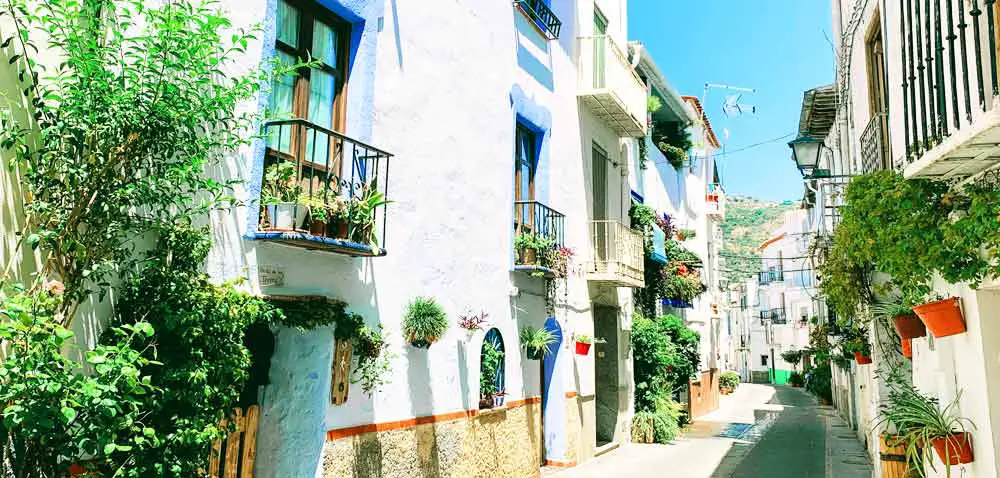
** Typical houses and streets in Lanjarón.
4. How to Arrive
Lanjarón is located just 46 kilometers south of the city of Granada.
- From Granada - Driving south from Granada on the main N-323 highway towards the coast, look for the signs indicating "Las Alpujarras" and "Lanjarón" as you pass over the mountains. Exit the highway and head towards the left (east). Roads will be clearly marked.
- From Malaga - take the A-7 motorway (or the older, slower and more scenic N-340 highway that runs parallel to the A-7) east towards Almuñécar, Motril, and Almería. In about 20 minutes after passing Almuñécar and when you reach Salobreña, take highway N-323 towards Granada. Lanjarón is located only 34 kilometers from Salobreña. As you climb the mountains you will pass a dam and a lake on your left. Look for signs indicating "Las Alpujarras" and "Lanjarón". Exit the highway and head towards the right (east).
- From Almería - take the N-340 highway west towards Málaga and Almuñécar. When you reach Salobreña (before Almuñécar), take highway N-323 towards Granada. Follow the directions noted above.
Save money on your next trip with our favorite travel websites!
| Find the Cheapest Hotels: | |
| The Largest Selection of Villas & Apartments: | |
| Cheapest, Most Reliable Car Rentals: | |
| Best Bus & Train Fares: | |
| Huge Selection of the BEST Tours & Activities | |
| Discount Tickets to Museums & Attractions | |
5. Parking
As you enter Lanjarón from the west you will see a small parking lot on the left-hand side of the road. There is also parking along the road on the right. Other than these areas most people just park along the main road where they can find a spot.6. A Brief History of Lanjarón and its Castle
The Timeline:
- It is thought that Lanjarón dates to pre-Roman times and derived its name from the Roman word "Lanchar" meaning "place abundant in water"... and that it is!
- Arabic Times - Records from the 13th century have been found referencing this village as an integral part of the "Dynasty of Alhamar" which was named for Muhámmad ibn Yúsuf ibn Nasr, the first king of the Kingdom of Granada and the founder of the Nasrid dynasty.
He ruled between 1238 and 1273 and was better known as "Ibn al-Aḥmar" or Castilianized "Alhamar" ("El Rojo"), due to the red color of his beard.
Lanjarón became increasingly important to the dynasty due to its strategic location, as it controlled the access roads to the entire Alpujarra area and the road that connected Granada with the coast.
- The Christian King Ferdinand conquered Lanjarón in 1490, but the Muslims revolted ten years later. Their fight, however, was unsuccessful provoking the leader of the Moors to jump from the highest tower of the castle to his death, just before their utter defeat... so as not to have to surrender to the Christians.
- From its position overlooking the valley, Lanjarón also played an important role during the War of Independence against Napoleon and his troops. The towns "cañoneros" or "cannon shooters", as they were called, fired against the French troops as they crossed the valley. One of the cannons still stands today along the main road.
- Even though the local medicinal waters have been appreciated since ancient times, it was not until the 19th century when Lanjarón became a renowned health spa.



